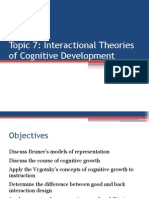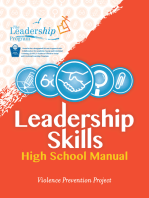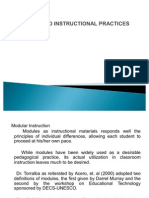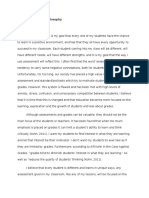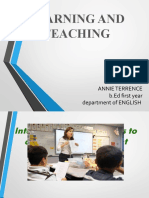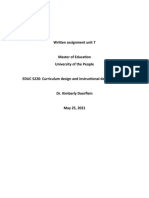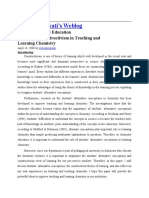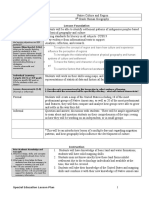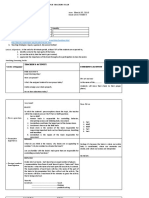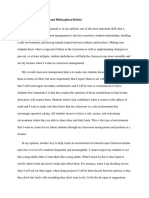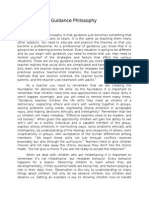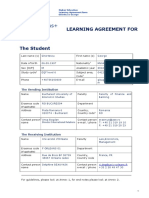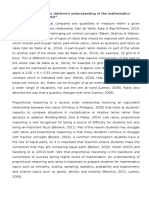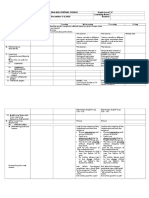Generic Lesson Plan Form
Generic Lesson Plan Form
Uploaded by
Katsuro KouCopyright:
Available Formats
Generic Lesson Plan Form
Generic Lesson Plan Form
Uploaded by
Katsuro KouOriginal Description:
Copyright
Available Formats
Share this document
Did you find this document useful?
Is this content inappropriate?
Copyright:
Available Formats
Generic Lesson Plan Form
Generic Lesson Plan Form
Uploaded by
Katsuro KouCopyright:
Available Formats
HCPSS Lesson Plan Format
DRAFT
Howard County Generic Lesson Plan Format
Tell students what youre going to teach, teach it to them, then ask them to say, show, or apply what theyve learned.
Unit: (Taken from the HCP Lesson Title:
!ssential Curriculum"
esignate a!!ro!riate strategies"areas
Teaching Strategies
,,, caffolded -uestioning
Objectives: (Taken from the HCPSS Essential Curriculum, which is #ased on $aryland Content tandards%&oluntary tate Curriculum". '#(ectives)
$ust #e written in #ehaviorally measura#le terms $ust inform students a#out e*actly what they are e*pected to know and #e a#le to do at the completion of this lesson $ust match assessment e*pectations and #e reflected in ru#rics, tests, and all other formative and summative authentic and alternative assessments.
Time required: !stimated num#er of minutes re+uired for the lesson #aterials) (3ist of all materials that will #e needed for the lesson"
.nclude planning for cleanup and reorgani;ation of materials for su#se+uent classes, e.g. science la#s, mathematics manipulatives, art, P.!. supplies, etc. .nclude pertinent e+uipment%la# safety rules in plans. Have #ackup plans and materials when technology is used in the event that we#site access is interrupted or pro#lems occur.
,,, .ndependent /eading ,,, .nterpretation of 0raphics (maps, graphs, cartoons, ta#les1" ,,, Concept 2ttainment ,,, Cooperative 3earning ,,, Think4Pair4 hare ,,, /oundta#le ,,, 5igsaw ,,, Pairs Check%/eview ,,, .ndependent%0roup Pro(ect ,,, .ntegration of Technology ,,, Print alternatives, i.e., !4te*t ,,, 6se of 2udio Clip%$usic ,,, .nteractive tudent 7ote#ook8 ,,, 9ormal :riting ,,, .nformal :riting ,,, 0raphic%&isual 'rgani;ers ,,, $odeling%<emonstration ,,,Think 2loud ,,, /eciprocal Teaching ,,, 0roup 2ctivities ,,, imulation ,,, 6se of &ideo Clip ,,, 3ecture =#ursts ,,, >4minute pause ,,, <ifferent purposes for viewing%reading ,,, Cross4Curricular Connections 'ther,,,,,,,,,,,,,,,,,,,
Pre$%ssessment o& Prior 'no(ledge: ?<rill@ :arm4up@ 2nticipation 0uide@ A:3@ Pre4test" ...provides a review of previous knowledge learned in class or in the =real world and a connection to what will #e learned in this lesson.
2llows the teacher to connect formerly e*perienced knowledge to new information. Prevents repetition of ideas previously mastered #y students. /einforces students metacognitive skills and network to connect
(<ifferentiate Content, Product, Process" ,,, Tiered assignments ,,, 9le*i#le grouping ,,, 3earning centers ,,, Curriculum compacting ,,, &arying +uestions ,,, .ndependent Pro(ects ,,, Brain Compati#le .nstruction ,,, Cultural Conte*t ,,, $ultiple .ntelligences
i&&erentiation Strategies
prior knowledge to new concepts and constructs. Engagement: (2nticipatory et, $otivation" ...provides a =hook to focus students attention and e*cite them to learn.
Learning #odalities
,,, &isual ,,, 2uditory ,,,Tactile%Ainesthetic
9ocuses student attention Provides an organi;ing framework for new ideas or information which will follow 2ssists in understanding a#stract ideas using analogies, e*amples, non4e*amples, and discrepant events.
)eneral %ccommodations to %ccess Curriculum ,,,2dapt the skill level
,,, 2dapt the num#er of items ,,, 2dapt materials ,,, Provide learning strategy ,,, Provide audio%video%digital access
4/27/05
HCPSS Lesson Plan Format
DRAFT
,,, .ncrease personal assistance
4/27/05
HCPSS Lesson Plan Format
DRAFT
Co$Teaching #odel
,,, 'ne lead%one support ,,, tation Teaching ,,, Two 0roups ,,, 2lternative Teaching ,,, $ultiple 0roups ,,, Team Teaching
Lesson evelo!ment"Procedures: (Body of the 3esson" %ctivit* <esign at least two CD to ED minute lesson segments and structure transitions. ( egment length should reflect attention span of students." Considerations1
Be sure activity matches o#(ectives. !*plicitly teach skills (including thinking skills and interpersonal skills" that students need to complete the activity successfully. Be sure roles and responsi#ilities are clear for group assignments. Be sure students understand what they are e*pected to do and what product(s", if any, they are to prepare.
+EP )oals"%ccommodations ,-ased on Students. +EP"/01 Plan2
4/27/05
HCPSS Lesson Plan Format
DRAFT
Transition Plan a structured way to end one activity and give directions for connecting it to the ne*t activity. %ctivit* Considerations1
Present new information in multiple ways to reach all learners (video clip, reading, visual images, PowerPoint presentation, lecture =#ursts". Connect new information to previously learned knowledge or skills. /elate new information to real4world scenarios.
,,,3iterary ,,,.nformational
3eading Strategies Te*t
-e&ore
Transition Plan a structured way to end one activity and give directions for connecting it to the ne*t activity. %ctivit* Considerations1
,,, Purpose ,,, Prior knowledge ,,, Preview ,,, &oca#ulary%Concepts ,,, Predict
Be sure students have the opportunity to practice new knowledge and skills individually and with the teacher present. Provide opportunities for enrichment, as well as re4teaching and addressing .!P% P goals. Be sure activities re+uire students to use higher order thinking skills
,,, Chunking ,,, elf4monitoring through clarifying +uestions and notations on te*t ,,, /eread ,,, $etacognitive conversation
uring
%&ter
,,, ummari;e or paraphrase ,,, :rite BC/s in response to reading +uestions ,,, 6se ru#rics
(i.e., application of knowledge, analysis and synthesis of information, evaluation of processes and products." Transition Plan a structured way to end last activity. Be sure there is time for students to clean up and give full attention to lesson closure. Closure: ( ummary@ !*it +uestions@ ilent e*it slips, etc." 1#rings students #ack to the lesson o#(ectives to discern if they learned the material, i.e., = how me or tell me what new information you learned in todays lesson and how you will use it in your life.
)eneral 3eading Processes
Cues students that they are at the end of todays lesson Helps students organi;e their learning Provides opportunity for varied ways for students to show learning /einforces main points and unites them in a coherent whole Connects to the real world to enhance retention and meaning /einforces metacognition
,,, <ecoding ,,, &oca#ulary ,,, 9luency ,,, Comprehension (Clarifying, &isuali;ing, -uestioning, Predicting, 2ccessing Prior Anowledge, ummari;ing, $aking .nferences, and <etermining $ain .dea"
%!!roaches to 3eading in the Content %rea
,,, /eading 2pprenticeship8 444 Other
4/27/05
HCPSS Lesson Plan Format
Chec5ing &or Understanding throughout the Lesson (!P/@ tructured -uestions" 1checks to see if students =got it correctly #efore proceeding to new concept or skill or to the ne*t segment of the lesson.
DRAFT
Ever* Pu!il 3es!onse ,EP32 Strategies
Plan specific +uestions and how students will answer. 6se these throughout the lesson to #e sure that students understand the information taught in each lesson segment. 6se !P/ strategies fre+uently to #e sure !2CH student understands lesson content. 6se higher levels of Blooms Ta*onomy to develop +uestions that
,,, Choral 2nswer ,,, Thum#s 6p%Thum#s <own ,,, C, E, > 9lash ,,, :ritten 2nswers on :ipe Boards ,,, how of Hands ,,, Cue Cards ,,, Think, Pair, hare
ensure transfer and retention of new information. 0uides the teacher in knowing whether to continue the lesson or to T'P and re4teach #efore proceeding to the ne*t activity. %ssessment: (/eview of 2nticipation 0uides@ Post4tests@ BC/s@ -ui;;es@ Tests@ Pro(ects@ !ssays@ Performance 2ssessments, etc." 1allows the students to demonstrate what they have learned and what they need to have re4presented in another more effective way. 1allows the teacher to see what was learned successfully and what must #e re4taught.
3inks directly to the stated '#(ective(s" .s ongoing and is in alternative forms Provides a roadmap for individual and whole class learning and achievement <rives future instruction
,,, Collect and 0rade ,,, Check for Completion ,,, .n4Class Check ,,, /u#ric ,,, Checklist ,,, Peer% elf 2ssessment ,,, 5ournal%3earning 3og ,,, Portfolio ,,, Constructed /esponse ,,, -ui; ,,, Test ,,, Presentation ,,, Performance 2ssessment ,,, .nformal 2ssessment ,,, !*it lip ,,, 'ther
%SSESS#E6T
Home(or5"Enrichment: (.ntegrated /eading and%or :riting 2ssignments@ /eflective 5ournals@ Pro(ects" 1takes the learning out into the real world and provides opportunities for additional practice and connections at home and with families
.s practice of learned material, not new material. .s designed to #e completed in a reasona#le amount of time. :arrants immediate feed#ack to #e meaningful. /e+uires home and school support (particularly for young children". 3inks to recent learning conte*t.
4/27/05
You might also like
- Task 2Document5 pagesTask 2api-708067647No ratings yet
- Tpe Observation Tracking Form 2019Document8 pagesTpe Observation Tracking Form 2019api-508884660No ratings yet
- Nondirective Teaching Model Lesson Plan C BurtDocument4 pagesNondirective Teaching Model Lesson Plan C Burtapi-524542474No ratings yet
- Delivery of Instruction With Paula NaugleDocument2 pagesDelivery of Instruction With Paula NaugleClaudia Javier Mendez0% (1)
- Ladmmm6 Memos 4Document9 pagesLadmmm6 Memos 4nblaks100% (1)
- Math 20-3 Lesson PlanDocument5 pagesMath 20-3 Lesson Planapi-2576722730% (1)
- Topic 7-Interactional TheoriesDocument36 pagesTopic 7-Interactional Theorieskhaldon70No ratings yet
- Lesson Plan - Meaghan Smith - Pumpkin InvestigationDocument5 pagesLesson Plan - Meaghan Smith - Pumpkin Investigationapi-302417067No ratings yet
- PBL Romeo and Juliet UnitDocument11 pagesPBL Romeo and Juliet UnitLauren FornerNo ratings yet
- Physical Education JHS 1 - 3Document73 pagesPhysical Education JHS 1 - 3Mohammed Abu Shaibu67% (12)
- S'gaw Karen Lessons Book 2Document312 pagesS'gaw Karen Lessons Book 2papanda1995100% (1)
- Leadership Skills: High School Manual: Violence Prevention ProgramFrom EverandLeadership Skills: High School Manual: Violence Prevention ProgramNo ratings yet
- Innovative Teaching StrategiesDocument3 pagesInnovative Teaching StrategiesJemuel LuminariasNo ratings yet
- (Prelim) - Educational Reforms (The K-12 Curriculum Example)Document7 pages(Prelim) - Educational Reforms (The K-12 Curriculum Example)nicolai cortesNo ratings yet
- Intended VsDocument14 pagesIntended VsRyan Morales67% (3)
- Learning Episode 1.Document3 pagesLearning Episode 1.Anny May GusiNo ratings yet
- CL EDU 503 Sample Constructivist Lesson PlanDocument7 pagesCL EDU 503 Sample Constructivist Lesson PlanCheska Lorena100% (2)
- Improved Instructional PracticesDocument25 pagesImproved Instructional Practicescj_tualaNo ratings yet
- Kratochwill DeRoosbBlair Classroom Management Teachers ModulesDocument13 pagesKratochwill DeRoosbBlair Classroom Management Teachers ModulesМария РыжковаNo ratings yet
- Sara Kohandel - TPGPDocument4 pagesSara Kohandel - TPGPapi-463782993No ratings yet
- Edtpa Lesson PlansDocument11 pagesEdtpa Lesson Plansapi-338231791No ratings yet
- Assignment - Planning An Action ResearchDocument6 pagesAssignment - Planning An Action ResearchAsma Ali100% (2)
- Lesson Plan ReflectionDocument3 pagesLesson Plan Reflectionapi-550782205No ratings yet
- Planner Teaching As InquiryDocument2 pagesPlanner Teaching As Inquirymerryl8506No ratings yet
- Child AssessDocument21 pagesChild AssessAshley Ibe GuevarraNo ratings yet
- Competency Checklist For Fs1 (2 Copies)Document1 pageCompetency Checklist For Fs1 (2 Copies)dweezillNo ratings yet
- The Blue-Print of ASSURE Instructional ModelsDocument3 pagesThe Blue-Print of ASSURE Instructional ModelsFery AshantiNo ratings yet
- Chapter 1 To 3Document115 pagesChapter 1 To 3TeacherBechay VlogNo ratings yet
- BrunerDocument13 pagesBrunerLauraNo ratings yet
- Edug 808 Unit Plan-FinalDocument26 pagesEdug 808 Unit Plan-Finalapi-273543630No ratings yet
- Course Code: MEM 602 Course Description: Educational Leadership Presenter: Benilda N. Pulvera Professor: Jinefer Favila-ButuDocument5 pagesCourse Code: MEM 602 Course Description: Educational Leadership Presenter: Benilda N. Pulvera Professor: Jinefer Favila-ButuKrizza Joy PeducaNo ratings yet
- Assessment Philosophy - FinalDocument5 pagesAssessment Philosophy - Finalapi-332187763No ratings yet
- Learning and Teaching: Submitted by Annie Terrence B.ed First Year Department of ENGLISHDocument16 pagesLearning and Teaching: Submitted by Annie Terrence B.ed First Year Department of ENGLISHAnnie TerrenceNo ratings yet
- Inclusive EducationDocument37 pagesInclusive EducationEstela AntaoNo ratings yet
- Science of Teaching Reading and WritingDocument159 pagesScience of Teaching Reading and WritingkaremNo ratings yet
- My Classroom Management PlanDocument21 pagesMy Classroom Management Planapi-256021953100% (1)
- 10 Concept of Teaching and LearningDocument53 pages10 Concept of Teaching and LearningHIMS CONNo ratings yet
- The Individualized Instruction MethodDocument18 pagesThe Individualized Instruction MethodFroilan TinduganNo ratings yet
- What Is Standardized TestingDocument5 pagesWhat Is Standardized TestingLe Di ChangNo ratings yet
- Classroom Management PlanDocument5 pagesClassroom Management Planapi-280269552No ratings yet
- Discovery MethodDocument6 pagesDiscovery Methoddulal duttaNo ratings yet
- Yuli Rahmawati's Weblog: Soulful of Science Education The Role of Constructivism in Teaching and Learning ChemistryDocument10 pagesYuli Rahmawati's Weblog: Soulful of Science Education The Role of Constructivism in Teaching and Learning ChemistryZaid MajidNo ratings yet
- Inquiry Based LearningDocument30 pagesInquiry Based LearningKristy ManuelNo ratings yet
- Lesson Foundation: Title and # Within Unit Grade LevelDocument4 pagesLesson Foundation: Title and # Within Unit Grade Levelapi-344731850No ratings yet
- Scn610-Schoolcounselinglessonplantemplate-Hp 1Document6 pagesScn610-Schoolcounselinglessonplantemplate-Hp 1api-722055308No ratings yet
- A. Topic: Parts of The Brain B. Skills: Illustrating, Identifying, Defining C. MaterialsDocument5 pagesA. Topic: Parts of The Brain B. Skills: Illustrating, Identifying, Defining C. MaterialsMaria Karina FerrerasNo ratings yet
- Intern Keys Evidence SPEDDocument7 pagesIntern Keys Evidence SPEDjenNo ratings yet
- EDU 3104 SEM 3 QuestionDocument7 pagesEDU 3104 SEM 3 QuestionAudrina Mary JamesNo ratings yet
- Theories and Approaches in Teaching MathematicsDocument7 pagesTheories and Approaches in Teaching MathematicsJhunaQuisitXDNo ratings yet
- FACLITATING LEARNER CENTERED Module 1 and Module 2Document9 pagesFACLITATING LEARNER CENTERED Module 1 and Module 2JUNALYN ALIGWAYNo ratings yet
- Reaching All Children in The ClassroomDocument39 pagesReaching All Children in The ClassroomGlen MurphyNo ratings yet
- Assure Lesson Plan Template ChewningDocument3 pagesAssure Lesson Plan Template Chewningapi-355591298No ratings yet
- Classroom Management PlanDocument8 pagesClassroom Management PlanT.j. Miller100% (1)
- Udl Lesson Plan TemplateDocument2 pagesUdl Lesson Plan Templateapi-271059388No ratings yet
- Nueva Vizcaya State University College of Teacher Education Rating Scale For Student-TeacherDocument6 pagesNueva Vizcaya State University College of Teacher Education Rating Scale For Student-TeacherKimberly De Vera-AbonNo ratings yet
- Guidance PhilosophyDocument4 pagesGuidance Philosophyapi-300953294No ratings yet
- 7E Learning Cycle Model: A Paradigm Shift in Instructional ApproachDocument10 pages7E Learning Cycle Model: A Paradigm Shift in Instructional ApproachJo SenseyNo ratings yet
- Classroom Management 2Document17 pagesClassroom Management 2Ryan EchazarNo ratings yet
- Fundamentals For Experiential LearningDocument24 pagesFundamentals For Experiential LearningSanjiv KausheshNo ratings yet
- Curriculum DesignDocument18 pagesCurriculum DesignPalero RosemarieNo ratings yet
- Multiple IntelligencesDocument12 pagesMultiple IntelligencesVirginia Canabal100% (1)
- Exemplary Classroom Questioning: Practices to Promote Thinking and LearningFrom EverandExemplary Classroom Questioning: Practices to Promote Thinking and LearningRating: 5 out of 5 stars5/5 (1)
- Curriculum Vitae OF: Jannatul NaimDocument3 pagesCurriculum Vitae OF: Jannatul NaimPolash AliNo ratings yet
- No Mans Land-ThrowingDocument5 pagesNo Mans Land-Throwingapi-276379355No ratings yet
- Learning Agreement For Studies The StudentDocument16 pagesLearning Agreement For Studies The StudentGeorge GhertescuNo ratings yet
- in The ClassroomDocument22 pagesin The ClassroomRaduMonicaLianaNo ratings yet
- Lesson 3.3 Curriculum Mapping and Curriculum Quality AuditDocument2 pagesLesson 3.3 Curriculum Mapping and Curriculum Quality AuditJAMIG, MA.LOURDES H.No ratings yet
- Long Form Lesson Plan Template: Rationale/ContextDocument5 pagesLong Form Lesson Plan Template: Rationale/Contextapi-385840602No ratings yet
- CTL ReflectionDocument6 pagesCTL Reflectionapi-374378404No ratings yet
- CV PillyDocument3 pagesCV PillyKaiGwa100% (2)
- Assignment 2Document11 pagesAssignment 2api-357935623No ratings yet
- Proforma Mte 3102 - Mathematics Education CurriculumDocument3 pagesProforma Mte 3102 - Mathematics Education CurriculumMUHAMMAD RIDHUAN BIN HANAFINo ratings yet
- Detailed Lesson Plan in English ThreeDocument6 pagesDetailed Lesson Plan in English ThreeJayral Sidon Prades100% (3)
- Leaflet Hearing ImpairmentsDocument8 pagesLeaflet Hearing ImpairmentsPeter Van GilsNo ratings yet
- Ican Journalsjulysept2014Document24 pagesIcan Journalsjulysept2014Luke ShawNo ratings yet
- Lesson Plan of ShapesDocument3 pagesLesson Plan of Shapesapi-339056999No ratings yet
- DLL Grade 5 EnglishDocument10 pagesDLL Grade 5 EnglishDan Zky0% (1)
- Subject Combination Briefing FaqsDocument2 pagesSubject Combination Briefing FaqsSeah Qing Yu HernandezNo ratings yet
- Collaboration Lesson Plan Georgias Story Begins 2nd GradeDocument2 pagesCollaboration Lesson Plan Georgias Story Begins 2nd Gradeapi-241355685No ratings yet
- HW wk14 Due December 4 NoneDocument3 pagesHW wk14 Due December 4 Noneapi-234845283No ratings yet
- Speaking: 32 Thursday 11 Writing Science and TechnologyDocument1 pageSpeaking: 32 Thursday 11 Writing Science and TechnologyAyu Mohd YusoffNo ratings yet
- Lesson Plan Reading EnglishDocument3 pagesLesson Plan Reading EnglishMohammadNo ratings yet
- Teacher A Observation Form 2 Feb 24Document7 pagesTeacher A Observation Form 2 Feb 24api-248910805No ratings yet
- NAME: - POSITION: - Objectives Acceptable Mov'S Submitted Mov'S RemarksDocument2 pagesNAME: - POSITION: - Objectives Acceptable Mov'S Submitted Mov'S RemarksJannet Viacruses Larcena0% (1)
- Teaching Learning MaterialsDocument69 pagesTeaching Learning MaterialssureshabcdNo ratings yet
- Nepalese Management Education: A View From The High CountryDocument19 pagesNepalese Management Education: A View From The High Countryihavenoidea33No ratings yet
- #7 Straight Talk About Pentatonic ScalesDocument14 pages#7 Straight Talk About Pentatonic ScalesEdward ShawNo ratings yet
- Rpi Ppki 9Document14 pagesRpi Ppki 9api-288224940No ratings yet
- Steinen Resume 2019Document2 pagesSteinen Resume 2019api-301037528No ratings yet






